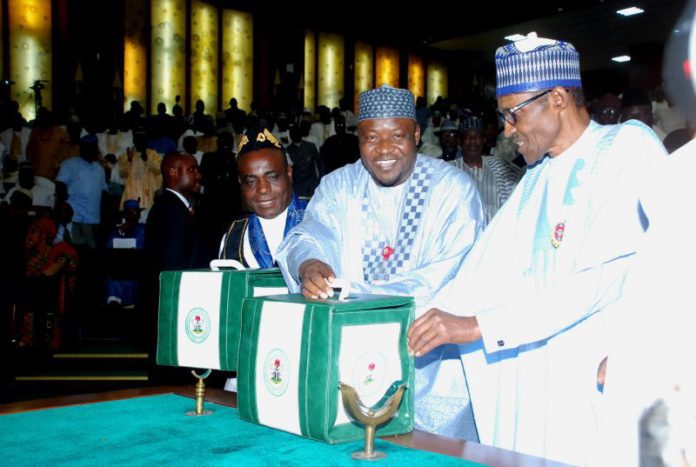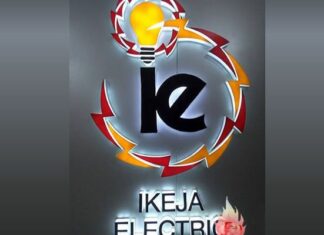*Three tiers of govt to receive 12% more revenue in 2018
*N45b proposed for Boko Haram-ravaged North East
Infrastructure, represented by the Ministry of Power, Works and Housing and Ministry of Transportation, and Defence, will take the bulk of federal capital spending in 2018, according to a proposal submitted by President Muhammadu Buhari to the National Assembly Tuesday.
The three ministries will get money more than the 12 other sectors combined.
Dubbed the ‘Budget of Consolidation,’ President Buhari said the budget would consolidate on the achievements of previous budgets and deliver on Nigeria’s Economic Recovery and Growth Plan (ERGP) 2018 – 2020.
Giving a further breakdown of the budget, Buhari said that 30.8 percent (or N2.652 trillion) of the budget will be allocated to capital expenditure while N3.494 trillion is budgeted for recurrent expenditure.
Details of the budget proposal revealed that the Power, Works and Housing has the highest capital project proposal with N555.88 billion.
The president listed some projects which will be executed under this sector in 2018 to include the Mambilla hydro power project and the National Housing Programme.
Transportation sector comes second with a projected allocation of N263.10 billion for capital projects.
Specifically, N12 billion counterpart funding is earmarked for transmission lines and substations, N10.00 billion for the 2nd Niger Bridge; and N300 billion for the construction and rehabilitation of the strategic roads.
The third sector to attract most in capital expenditure proposal is Special Intervention Programmes with N150.00 billion and Defence, fourth with N145.00 billion.
Other sectors are Agriculture and Rural Development, N118.98 billion; Water Resources: N95.11 billion; Industry, Trade and Investment, N82.92 billion; Interior: N63.26 billion; Education N61.73 billion; Universal Basic Education Commission, N109.06 billion; Health, N71.11 billion; Federal Capital Territory, N40.30 billion; Zonal Intervention Projects, N100.00 billion; North East Intervention Fund, N45.00 billion; Niger Delta Ministry, N53.89 billion; and Niger Delta Development Commission, N71.20 billion.
Details of the budget proposal revealed that a significant increase is being projected in the revenue accruable from the oil and non-oil sectors.
“Based on the above fiscal assumptions and parameters, total federally-collectible revenue is estimated at 11.983 trillion Naira in 2018. Thus, the three tiers of Government shall receive about 12 percent more revenues in 2018 than the 2017 estimate.
“Of the amount, the sum of 6.387 trillion Naira is expected to be realised from oil and gas sources. Total receipts from the non-oil sector are projected at 5.597 trillion Naira.
“The Federal Government’s estimated total revenue is 6.607 trillion Naira in 2018, which is about 30 percent more than the 2017 target. As we pursue our goal of revenue diversification, non-oil revenues will become a larger share of total revenues. In 2018, we project oil revenues of 2.442 trillion Naira, and non-oil as well as other revenues of 4.165 trillion Naira.
“Non-oil and other revenue sources of 4.165 trillion Naira, include several items including: Share of Companies Income Tax (CIT) of 794.7 billion Naira, share of Value Added Tax (VAT) of 207.9 billion Naira, Customs & Excise Receipts of 324.9 billion Naira, FGN Independently Generated Revenues (IGR) of 847.9 billion Naira, FGN’s Share of Tax Amnesty Income of 87.8 billion Naira, and various recoveries of 512.4 billion Naira, 710 billion Naira as proceeds from the restructuring of government’s equity in Joint Ventures and other sundry incomes of 678.4 billion Naira.”
Throwing more light on the extra revenue, the president said that the three tiers of government would receive additional 12 per cent revenues in 2018.
According to him, based on the total federally-collectible revenue estimated at N11.983 trillion in 2018, the three tiers of government shall receive 12 per cent more revenues than the 2017 estimates.
“Of the amount, the sum of N6.387 trillion is expected to be realised from oil and gas sources.
“Total receipts from the non-oil sector are projected at N5.597 trillion,” Mr. Buhari said.
The president said that the federal government’s estimated total revenue was N6.607 trillion in 2018, about 30 per cent more than the 2017 target.
“As we pursue our goal of revenue diversification, non-oil revenues will become a larger share of total revenues.
“In 2018, we project oil revenues of N2.442 trillion and non-oil as well as other revenues of N4.165 trillion ,’’ he added.
The president said that non-oil and other revenue sources of N4.165 trillion would include share of Companies Income Tax (CIT) of N794.7 billion, Value Added Tax (VAT) of N207.9 billion as well as Customs and Excise Receipts, N324.9 billion.
“Others are Independently Generated Revenues (IGR) of N847.9 billion, Federal Government’s share of tax amnesty income of N87.8 billion and various recoveries of N512.4 billion.
It also includes N 710 billion as proceeds from the restructuring of government’s equity in joint ventures and other sundry incomes of N678.4 billion.
Meanwhile, the federal government will also be spending N45 billion under its special intervention for the war-wrecked northeast.
The proposed spending is expected to “consolidate” the gains being made in the current 2017 budget, the president said.
In his first mention of the northeast in his speech, the president announced the spending proposal, and later said N9.8 billion had been proposed for the Mambilla hydro power project, which he said includes N8.5 billion as counterpart funding. Mambilla is located in Taraba, a state within Northeast Nigeria.
Mr. Buhari said his administration’s absolute commitment to securing life and property in other parts of the country would be replicated in the war-wrecked northeast.
He said soldiers prosecuting the war against Boko Haram in the states of northeast would be supported and equipped to enable them achieve victory over the country’s enemies.
“We will ensure that our gallant men and women in arms are properly equipped and well-motivated,” he said.
He said it was due to the commitment of his government towards ending Boko Haram insurgency that resulted “in the gradual return to normalcy in the North East”.
“It is in this spirit that I recently assented to the North-East Development Commission Bill that was passed by this Distinguished House.
“We expect that this development will consolidate on our ongoing efforts to combat insurgency, reintegrate Internally Displaced Persons and rebuild communities in the North East Region, which have been adversely affected by the insurgency,” he said.
Unlike the N71.20 billion earmarked for the Niger Delta Development Commission, President Buhari did not clearly mention if the proposed N45 billion for Northeast Intervention Fund was meant to fund the new North-East Development Commission (NEDC).
(NAN)













